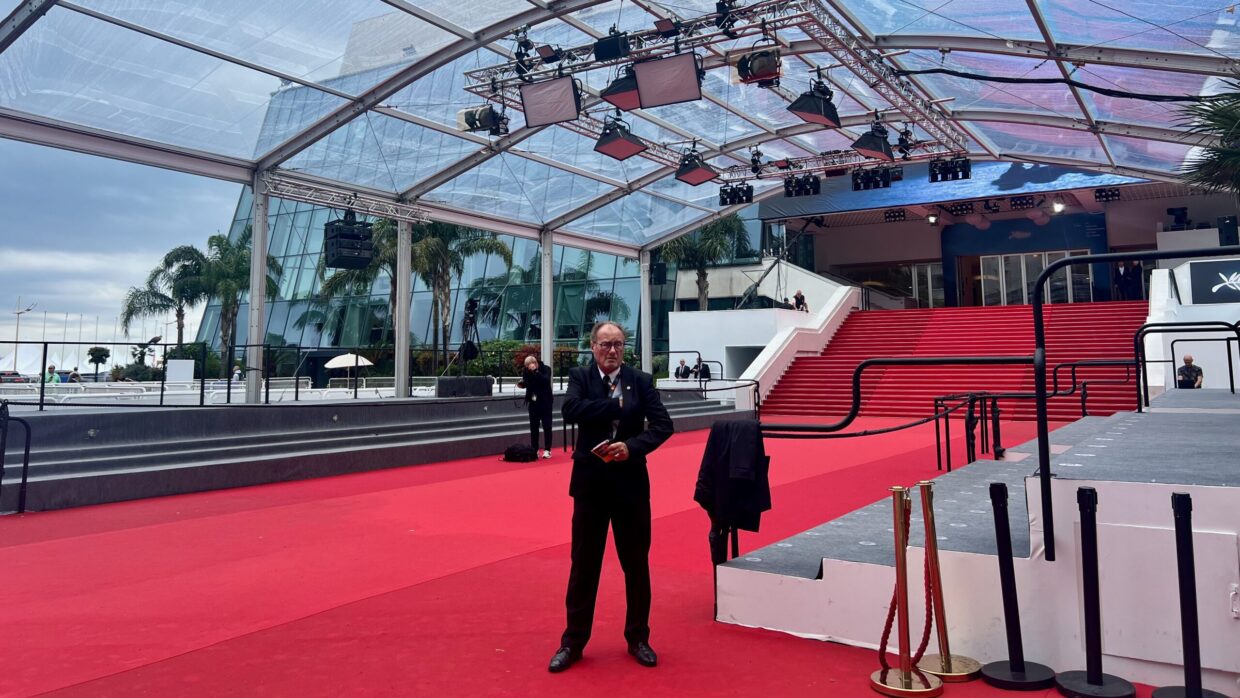 Back to selection
Back to selection
“Cannes Makes You Believe You Can Just Cosplay Who You Want To Be in the Industry”: Producer Stephanie Roush’s Cannes Producer Diary #2
 Cannes red carpet, before the deluge (Photo: Stephanie Roush)
Cannes red carpet, before the deluge (Photo: Stephanie Roush) Read Part One of producer Stephanie Roush’s Cannes 2024 Producer Diary here.
I think I have finally recovered from my week at Cannes. I have chosen water over rosé, and no longer feel the need to arbitrarily dress up to take a meeting, as if geographical proximity to a black-tie event somehow necessitates “proper attire,” or tenue correcte, as the French call it. And while I’m glad to have a reliable sleep schedule again, I miss micro-dosing espresso in-between meetings, seeing a movie at a moment’s notice, and running into New York friends more than I do when I’m actually in New York.
Cannes felt like a late capitalist fever dream: celebrity-laden streets, Rolls Royce traffic jams, and lavish parties supposedly existing in support of “independent cinema.” Washing my hands in a bathroom tucked away on the fourth floor of the Palais, I looked at myself in the mirror and noticed Lea Seydoux was washing her hands next to me, confirming that this was definitely not the bathroom I was supposed to be using. And yet, that’s what Cannes is about—sort of shimmying your way into opportunities. Which isn’t to say that washing my hands next to Lea Seydoux led to anything. I smiled at her in the mirror, she dried her hands using the pathetically weak hand dryer, and then left. Sneaking into that late night party on the beach might yield better results, but I am still waiting to see.
Cannes loves to insist upon itself, and yet that’s what I loved most about it. It is a bastion of global cinema, while at the same time operating as a fashion show for the rich and the famous. The balconies of La Croisette’s priciest hotels (The Majestic is often more than $4,500/night) function as the backdrops for Instagram grid posts for major and minor celebrities alike. So much so that my mom’s friend texted me “Did you know Cate Blanchett is also at Cannes?” Yes, I did, actually.
Cannes loves a big swing more than most festivals, and even though I didn’t love most of the movies I saw there, I appreciated them. I felt the “trickledown effect” of its penchant for big swings. I pitched projects in meetings with a gusto I did not know I could muster on so little sleep. I made friends at parties by simply going up to people and saying “I don’t know anyone here” (a great trick, by the way). And like the festival itself, I relished in the grandeur of it all, getting high on my own supply of the feeling that I could belong in such a place, in such company. The impostor syndrome that was haunting me prior to the festival faded over the week I was there. Cannes makes you believe you can just cosplay who you want to be in the industry. In fact, you can just show up to Cannes and suddenly be a person in the industry! Or, at least, that’s what the influencers do. Just the proximity to glamour and success can be intoxicating. Taking a meeting on a yacht doesn’t mean the meeting went any better than if it were at a poorly appointed WeWork in Pasadena. But it certainly feels good. And the rosé is much, much better.
Cannes, like many of my favorite films, has an expansive vision of what it can be, sometimes being many things to many people. I for one, fell prey to its magic. I can’t wait to go back.
Stephanie Roush is a Brooklyn-based independent producer and filmmaker. She produced Theda Hammel’s Stress Positions, starring John Early, which premiered at Sundance Film Festival (2024) and played Closing Night of New Directors/New Films (2024). Stress Positions is being distributed by NEON and is currently playing in select theaters across the U.S.
